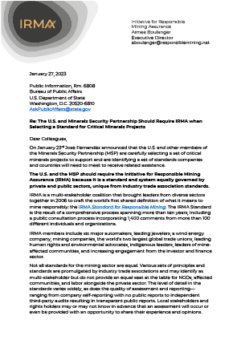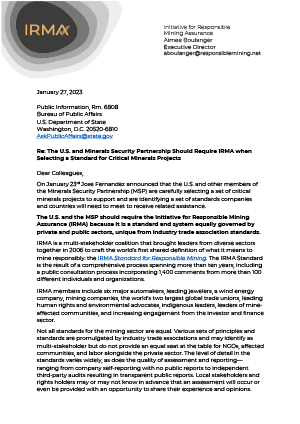Minerals Security Partnership, U.S. should require IRMA

Public Information, Rm. 6808
Bureau of Public Affairs
U.S. Department of State
Washington, D.C. 20520-6810
AskPublicAffairs@state.gov
Re: The U.S. and Minerals Security Partnership Should Require IRMA when Selecting a Standard for Critical Minerals Projects
Dear Colleagues,
On January 23rd Jose Fernandez announced that the U.S. and other members of the Minerals Security Partnership (MSP) are carefully selecting a set of critical minerals projects to support and are identifying a set of standards companies and countries will need to meet to receive related assistance.
The U.S. and the MSP should require the Initiative for Responsible Mining Assurance (IRMA) because it is a standard and system equally governed by private and public sectors, unique from industry trade association standards.
IRMA is a multi-stakeholder coalition that brought leaders from diverse sectors together in 2006 to craft the world’s first shared definition of what it means to mine responsibly: the IRMA Standard for Responsible Mining. The IRMA Standard is the result of a comprehensive process spanning more than ten years, including a public consultation process incorporating 1,400 comments from more than 100 different individuals and organizations.
IRMA members include six major automakers, leading jewelers, a wind energy company, mining companies, the world’s two largest global trade unions, leading human rights and environmental advocates, indigenous leaders, leaders of mine-affected communities, and increasing engagement from the investor and finance sector.
Not all standards for the mining sector are equal. Various sets of principles and standards are promulgated by industry trade associations and may identify as multi-stakeholder but do not provide an equal seat at the table for NGOs, affected communities, and labor alongside the private sector. The level of detail in the standards varies widely, as does the quality of assessment and reporting—ranging from company self-reporting with no public reports to independent third-party audits resulting in transparent public reports. Local stakeholders and rights holders may or may not know in advance that an assessment will occur or even be provided with an opportunity to share their experience and opinions.
IRMA stands out from industry trade association standards because it is recognized across stakeholder sectors and has already been recognized by multiple MSP members. The United Kingdom’s 2022 Critical Minerals Strategy references IRMA as a globally recognized framework for responsible mining.[1] In 2021, the White House referenced IRMA in its 100-Day Review on Building Resilient Supply Chains, noting that IRMA is a possible “method for U.S. companies and the Federal Government to ensure that minerals are being sourced from mines with robust environmental, social, and financial responsibility practices.”[2] The European Parliament referenced the IRMA Standard in its 2021 strategy for critical raw materials.[3] The Government of Australia called IRMA a “no regrets approach” in its 2020 study of certifications and strategies to increase competitiveness of Australian battery materials for use in the EV sector in Europe.[4]
IRMA is the only standard for the mining sector that fully embodies the Biden Administration’s environmental justice goals. This is because IRMA is the only standard for the mining sector that:
- is equally governed by directly affected communities, NGOs, labor unions, mining companies, purchasing companies, and the investor and finance sector;
- requires public notice in advance of an audit so that local stakeholders and rights holders can prepare to engage in the audit;
- is applicable globally and covers all mined materials (apart from thermal coal, uranium, and deep seabed mining projects);
- includes the full range of environmental and social issues related to industrial-scale mines;
- requires detailed public reports made available at no cost to the public, with scoring and rationale on over 26 topics across over 400 requirements; and
- has demonstrated credibility with civil society and labor unions.
IRMA is built on best practice norms. Existing international systems and frameworks form the basis of requirements in the IRMA Standard and are assessed in IRMA audits. These include but are not limited to the Extractive Industries Transparency Initiative (EITI), the International Cyanide Management Code, International Finance Corporation (IFC) Performance Standards, International Labour Organization Conventions, International Union for Conservation of Nature (IUCN) Protected Area Management Categories, the Minamata Convention on Mercury, OECD Due Diligence Guidance, UNESCO Biosphere Reserves, the United Nations Guiding Principles on Business and Human Rights, and the Voluntary Principles on Security and Human Rights.
IRMA requires completion of an independent third-party audit before any public claims may be made related to IRMA achievement. The IRMA system enables companies to clearly communicate their performance across a holistic set of best practices and work toward continuous improvement in environmental and social responsibility.
IRMA’s equal governance model upholds a standard and system that creates confidence and value across all stakeholder sectors and greater trust across supply chains. The U.S. and MSP should support and incentivize the IRMA Standard and system because of its unique accountability to all sectors and alignment with the MSP’s commitment to “adhere to the highest environmental, social, and governance standards.”[5]
Sincerely,
Aimee Boulanger,
IRMA Executive Director
[1] United Kingdom Department for Business, Energy & Industrial Strategy, Resilience for the Future: The UK’s Critical Minerals Strategy, July 22, 2022, https://www.gov.uk/government/publications/uk-critical-mineral-strategy/resilience-for-the-future-the-uks-critical-minerals-strategy.
[2] The White House, Building Resilient Supply Chains, Revitalizing American Manufacturing, and Fostering Broad-Based Growth: 100-Day Reviews Under Executive Order 14017, June 2021, https://www.whitehouse.gov/wp-content/uploads/2021/06/100-day-supply-chain-review-report.pdf.
[3] European Parliament, A European Strategy for Critical Raw Materials, November 24, 2021, https://www.europarl.europa.eu/doceo/document/TA-9-2021-0468_EN.html.
[4] UTS Institute for Sustainable Futures and the University of Melbourne, Certification and LCA of Australian Batter Materials – Drivers and Options: Scene Setting Project Prepared for Future Battery Industries CRC, Future Battery Industries CRC, Australian Government Department of Industry, Innovation and Science Business Cooperative Research Centres Program, August 2020, https://fbicrc.com.au/wp-content/uploads/2020/10/Certification-of-Au-Battery-Materials-WEB-INTERACTIVE-SEPT-2020.pdf.
[5] U.S. Department of State, Minerals Security Partnership, June 14, 2022, https://www.state.gov/minerals-security-partnership/.


